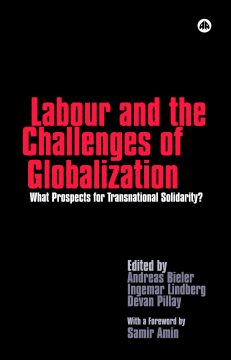
BOOK
Labour and the Challenges of Globalization
Andreas Bieler | Ingemar Lindberg | Devan Pillay
(2008)
Additional Information
Book Details
Abstract
This book critically examines the responses of the working classes of the world to the challenges posed by the neoliberal restructuring of the global economy.
Neoliberal globalisation, the book argues, has created new forms of polarisation in the world. A renewal of working class internationalism must address the situation of both the more privileged segments of the working class and the more impoverished ones.
The study identifies new or renewed labour responses among formalised core workers as well as those on the periphery, including street-traders, homeworkers and other 'informal sector' workers.
The book contains ten country studies, including India, China, South Korea, Japan, Germany, Sweden, Canada, South Africa, Argentina and Brazil. It argues that workers and trade unions, through intensive collaboration with other social forces across the world, can challenge the logic of neoliberal globalization.
'In an era when capital strikes back globally, old tools are not enough. New counter forces must be formed. The book makes an invaluable contribution to our understanding of the situation of the working class today'
Clas Linder, First Vice President, Swedish Transport Workers' Union.
'Breaks new ground by anchoring the response of labour to globalisation in the strategies of individual labour movements'
Eddie Webster, Professor of Sociology and Director of the Sociology of Work Unit at the University of the Witwatersrand in Johannesburg/South Africa.
